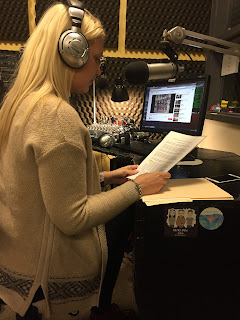Media Literacy Week - Day 3
 On November 8th, Indigenous Youth Radio
premiered their rebooted radio show with new host Chantal McGregor.
Chantal works at Council Fire Native as the Youth-Drop-In Wellness
Navigator and discussed Media Literacy Week and Treaty Recognition
Week for this series of the show, as they are on the same week.
Treaty Recognition Week is always the first week of November, so for
this year it was on November 5th to 11th, and this is the second
annual Treaty Recognition Week for the province of Ontario. This
celebration is meant to honour the importance of treaties and helping
people learn more about treaty rights and treaty
relationships.
On November 8th, Indigenous Youth Radio
premiered their rebooted radio show with new host Chantal McGregor.
Chantal works at Council Fire Native as the Youth-Drop-In Wellness
Navigator and discussed Media Literacy Week and Treaty Recognition
Week for this series of the show, as they are on the same week.
Treaty Recognition Week is always the first week of November, so for
this year it was on November 5th to 11th, and this is the second
annual Treaty Recognition Week for the province of Ontario. This
celebration is meant to honour the importance of treaties and helping
people learn more about treaty rights and treaty
relationships.Promoting greater awareness of treaties is one of efforts by the Ontario government to facilitate healing and reconciliation with Indigenous peoples. It is meant to be the government's commitment to work with Indigenous partners and rebuilding relationships based on trust and respect with First Nations, Métis and Inuit. The Treaties Recognition Week Act was introduced last year and passed with support of all parties on May 30th, 2016.
Chantal shared with us some highlights in the news that celebrate Treaty Recognition Week, such as media coverage from CTV News. She also defined to us what a treaty is for those that don’t know, stating they are legally binding agreements that set out the rights, responsibilities, and relationships of First Nations and the federal and provincial governments. These agreements were meant to be made to allow the government to utilize the land with the exchange of protection of the livestyle and livelihood of Indigenous people. Ontario is covered by over 40 treaties and other agreements, which include land purchases signed between 1781 and 1930.
In addition, Chantal talked about Media
Literacy Week, and what it means to the Indigenous community. For
example, because of our connected world, we are allowed to recognize
treaties in a way we wouldn’t have been able to prior to the
internet. In this way, the internet has helped Indigenous people by
recognizing the responsibilities the government has toward the
Indigenous people, when historically they have been ignored.
Additionally, the internet has helped
evolve the way in which Indigenous communities pass on knowledge.
Indigenous culture is historically about the oral tradition, passing
down wisdom from generations through storytelling from elders. But
with the advent of technology information, Indigenous cultures can
perpetuate their traditions through tutorials online on how to create
traditional clothing, traditional dance like jingle dress dancing,
and sacred drumming. For this show, we were able to showcase one
Indigenous artist throughout the show, Big River Cree, through easy
access from Youtube.
Because of Media Literacy, it has
helped Indigenous communities perpetuate their culture where
historically government has systematically tried to wipe it out. Now
things are changing, as the government tries to make amends by
celebrating the legitimacy of treaties and spreading knowledge of
culture throughout the province.
Download MP3
Comments